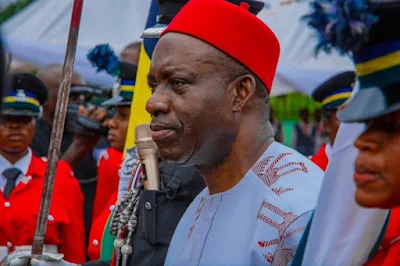Soludo Exonerates Fulani Herdsmen, Attributes Southeast Insecurity to Igbo Youths
Anambra State Governor, Prof. Chukwuma Soludo, has ignited a firestorm of controversy by asserting that 99.99% of criminals arrested for kidnappings and violent crimes in Anambra are Igbo youths, not Fulani herdsmen, challenging the widespread narrative that attributes Southeast insecurity to external actors. Speaking at a town hall meeting with the Anambra Diaspora community in Maryland, USA, on July 7, Soludo described the notion of Fulani herdsmen as the primary culprits as a “false narrative” propagated to mislead the public.
“In my three years and three months in office, 99.99% of the kidnappers and other criminals we’ve arrested are Igbo. Let’s stop the lies. Igbos are kidnapping and killing fellow Igbos, not Fulani,” Soludo stated, emphasizing that the so-called “liberators” hiding in forests are “homegrown criminals feeding fat on blood money.” He questioned how these groups sustain themselves, asking, “They live in the bushes for months, but who is paying for their services? Don’t they have needs?”
The governor’s remarks, captured in a widely circulated video, have sparked intense debate. Supporters, including @Al_ameeen_yabo on X, praised Soludo’s “courage to speak the truth,” arguing that his data-driven stance exposes internal criminality rather than scapegoating Fulani herdsmen. However, the International Society for Civil Liberties and Rule of Law (Intersociety) sharply rebuked Soludo, accusing his administration of “shielding Jihadist herdsmen since 2022” and aligning Anambra with the Federal Government’s controversial ranching policies. Intersociety’s chairman, Emeka Umeagbalasi, claimed that Fulani herdsmen operate in forest camps across communities like Awka South, Awka North, Oyi, Ayamelum, and Orumba, contributing to at least 30% of violent crimes in the state.
Soludo’s comments build on his earlier statements, such as a 2022 Channels TV interview where he insisted that “100% of apprehended criminals” in Anambra were Igbo, some hiding under the guise of Indigenous People of Biafra (IPOB) agitation, though IPOB has distanced itself from such acts. Critics, including community leaders, argue that while internal criminality exists, Soludo’s dismissal of Fulani herdsmen’s role ignores documented attacks. A 2021 report by Sahara Reporters detailed Fulani herdsmen killing over 30 Igbo-speaking indigenes in Benue, and a Catholic Bishop in Makurdi described their actions as “ethnic cleansing.”
The controversy has fueled calls for an independent inquiry into the true sources of Southeast insecurity. Community leaders urge collaboration between state and federal authorities to address both local and external threats transparently. As Anambra enjoys relative peace compared to three months ago, with Soludo claiming a significant reduction in insecurity, the debate over who is truly responsible—Igbo youths or Fulani herdsmen—continues to divide opinions, with far-reaching implications for regional unity and security policy.
